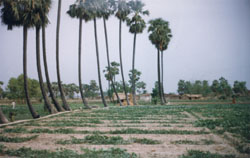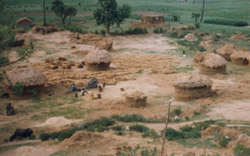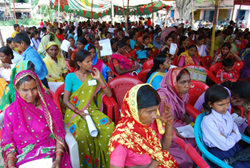|





|
The
Environment:
Most people of this
area are marginal farmers with an average land-holding of 0-2 acres.
Agriculture is the main source of livelihood, but the single rain fed
cereal crops are unable to feed most families for more than six months
of the year. There is a small quantity of millet, pulse and sugarcane
grown on marginal soils. There is no scientific agriculture undertaken
in the area and there is no facility for irrigation of crops during
the dry season.
The region is characterised
by alluvial soil. The best soils range from fertile rice -growing soils
of the plains to that on the gentle slopes used for the cultivation
of millet. Loss of fertility is inherent in both these soil types. Annual
recycling of biomass by deciduous plant species is helping to restore
soil fertility to some extent. The quality of soils is deteriorating
because of dwindling tree numbers and the increasing use of chemical
fertilisers in an attempt to increase productivity.
Climate
and Rainfall:
The climate of the region is characterised by three distinct seasons:
Summer (March to June), Monsoon (July to Sept./Oct.), and Winter (November
to February). The temperatures range from a maximum of 42 degrees during
summer to a minimum of 6 degrees during winter. The average annual rainfall
is 3100mm, but most of this water runs into the river. Soils retain
insufficient water due to the absence of trees in the catchment area.
There is no artificial source for irrigation.
ARD Environmental
Initiatives:
Domestic Waste Management: The project emphasises environmental
awareness, followed by the demonstration of proper management of domestic
wastes, including the introduction of vermi-culture compost pits, to
remedy those systems that are currently causing environmental degradation
and pollution.
In
2007, ARD received a grant from the Australian High Commission in India
to implement a 12 month long domestic waste management program. Further
trainings in Vermiculture have been given to the women and the knowledge
and practices are being disseminated into the community through the
Self Help Groups.
In conjunction with environmental
awareness raising workshops, ARD is distributing fruit trees (mango,
guava, amla) and medicinal trees to participants to strengthen community
commitment to sustainable environmental practices. This initiative is
generating a hands-on interest and take-up of sustainable agricultural
and environmental systems and help to address situations where farmers
are questioning the merits of organic agriculture.
The
World Environment Day awareness raising programme has been presented
since 2008 with help from the Cottonwood Foundation and the Rainforest
Information Centre.
World Environment
Day 2011:
The main target group were the women of the Self Help Groups, who will
serve as a resource base for promoting environmentally friendly practices
throughout the surrounding villages. Around 700 women participated the
workshop and in addition 100 farmers also attended.
Output of the Training
1. A road map was designed in which the Panchayati Raj (local government)
members together decide what schemes are to be designed for environment
purposes with money allocated by the government.
2. A strong networking and liasoning was created between ARD and government
officials who committed to assisting ARD in implementing environment-related
work in Guraru Block.
3. SHG members were made aware of different environment issues in their
area.
4. Government officers committed to extend their assistance for the
plantation work planned by ARD for July.
5. SHG members shared the successful case studies of ARD in relation
to environment issues which resulted in people knowing more of ARD’s
work.
It was found that SHG members
were very interested and highly enthusiastic about the workshop. Information
regarding the impact of deforestation, excessive use of polythene and
the ways in which people can preserve the natural resources were disseminated
among the participants. The important role that civil society and the
people of the villages have in preserving the environment was also discussed.
|

Success
Stories
Read
about women whose lives have been changed by ARD programmes
Photo
Gallery
Visit
our village images here
ARD
(Australia) Inc please click
here
Newsletter
Read ARD Newsletters here
Subscribe
to Mailing List here
ARD
Brochure
Download
Brochure here (330kb.pdf)
|






